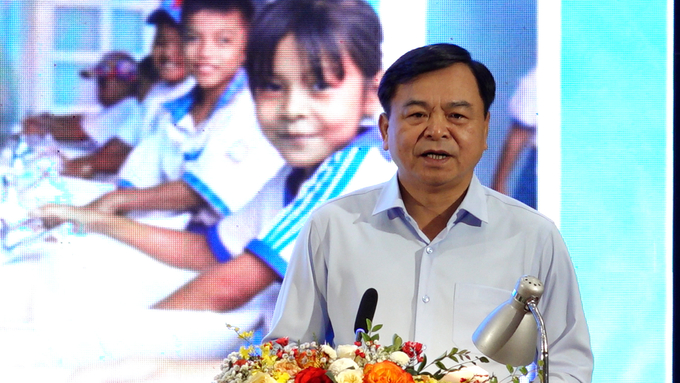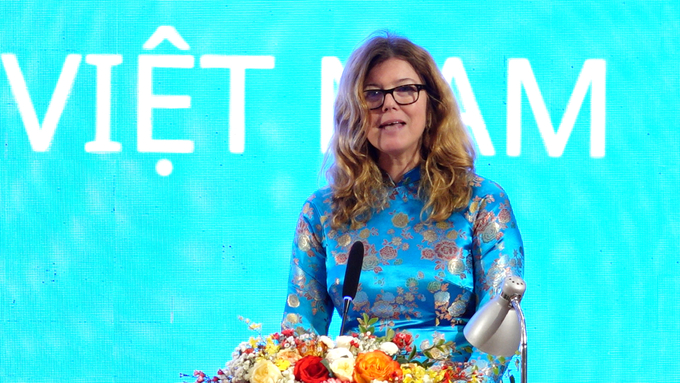November 26, 2025 | 17:50 GMT +7
November 26, 2025 | 17:50 GMT +7
Hotline: 0913.378.918
November 26, 2025 | 17:50 GMT +7
Hotline: 0913.378.918
The Ministry of Agriculture and Rural Development, in coordination with the United Nations Children's Fund (UNICEF) in Vietnam, held a national conference on the morning of November 15 to discuss rural clean water initiatives. The event aimed to outline solutions and plans for sustainable development in terms of rural water supply.
Over the years, Vietnam has made concerted efforts to implement comprehensive measures with the goal of securing access to clean water for its citizens. These efforts include developing policies and state management mechanisms, as well as executing specific programs and projects at national, regional, and rural levels across the country.

Deputy Minister of Agriculture and Rural Development Nguyen Hoang Hiep delivering a speech at the National Conference on Rural Clean Water Initiatives. Photo: Quang Dung.
By the end of 2023, Vietnam has implemented approximately 18,000 centralized rural clean water systems nationwide, with over 219 large-scale multi-communal water supply projects. Accordingly, these projects manage 116 facilities that supply over 5,000 cubic meters daily to local residents. These systems provide clean, standardized water to nearly 55% of the rural population and 94% of schools.
Households without access to centralized water systems have received technical, financial, and guidance support to collect, store, and treat water safely for daily use.
Despite advancements in rural water supply efforts, Vietnam's water initiatives face several challenges. Namely, the country's policy frameworks are incomplete, with regulatory inconsistencies and limited effectiveness. On the other hand, the demand for clean water investment is substantial, while public budget resources are limited. Furthermore, social funding mobilization efforts fail to meet practical needs, notably in remote and mountainous areas.
Several other issues include a lack of consistency among management models for clean water systems, low water prices and revenues, and inefficient operation in water supply facilities. In addition, freshwater resources are deteriorating due to climate change and pollution issues, which directly impact the sustainable supply of clean water for rural residents.
During the conference, Deputy Minister Nguyen Hoang Hiep emphasized, "Water plays an exceptionally crucial role in socio-economic development and in preserving the integrity of the natural environment. Water is an essential component of life and the environment. It is also a decisive factor for the survival and sustainable development of a nation. Securing access to clean water for all citizens nationwide is a goal that the Party, the Government, relevant ministries, local authorities, and rural citizens aim to achieve.
Consequently, this conference is an opportunity to reflect on our achievements, address existing challenges, and formulate detailed, coordinated solutions and plans to sustainably develop rural clean water efforts. This initiative will ensure that all rural citizens have access to safe, clean water at reasonable costs, with no exceptions."

Silvia, UNICEF Representative in Vietnam, warned that climate change poses a threat to both water resources and people’s livelihoods. Photo: Quang Dung.
Silvia, UNICEF Representative in Vietnam, cautioned that climate change is threatening both water resources and the livelihoods of Vietnamese citizens. In 2019, Vietnam ranked 13th among countries most heavily affected by global climate change, a reality that places significant pressure on local communities, especially in rural areas.
At present, over 30 million rural residents in Vietnam are unable to access clean water. This issue poses direct threats to public health and presents significant risks to the most vulnerable groups, including the elderly, women, and children.

In addition to its crucial role in daily life, water helps establish the foundation for livelihoods and social equity. Photo: Kim Anh.
According to the UNICEF Representative in Vietnam, the country must prioritize several key actions to address clean water challenges and climate change impacts. Most importantly, it should focus on expanding access to clean water, with an emphasis on rural areas, by mobilizing financial resources and developing water infrastructure.
Additionally, it is critical to support vulnerable groups such as women, children, the elderly, and low-income families by enhancing essential infrastructure, i.e., schools and health stations, to meet community needs.
On behalf of UNICEF, Rana Flowers, Chief Representative in Vietnam, shared that UNICEF has closely collaborated with MARD to implement many programs and projects, achieving many positive results over the past five years.
With various activities related to clean water and environmental sanitation in Vietnam, UNICEF hopes that MARD will continue to implement its long-term solutions and promote their sustainability moving forward.
Translated by Nguyen Hai Long

(VAN) The model of making a living under the forest canopy through the agroforestry system in Van Son commune, Bac Ninh province, is expected to generate an annual income of approximately VND 30 million/ha.

(VAN) Many enterprises in Can Tho are harnessing natural energy and reducing greenhouse gas emissions in their production processes, thereby contributing to the promotion of a sustainable green transition.
/2025/11/24/3536-2-112800_176.jpg)
(VAN) Dong Nai now has tens of thousands of hectares of forests certified for sustainable management, and this area will continue to be expanded in the coming period.

(VAN) Vinh Ha hamlet (Dai Xuyen commune, Hanoi) is shifting away from small-scale farming as households adopt bioscurity into their breeder chicken models.

(VAN) Heavy rains make aquatic species more vulnerable to disease. Proactive water management and high-tech systems help farmers prevent outbreaks and protect yields.

(VAN) Greenhouses are shifting production mindsets in Binh Lu commune, enabling farmers to ‘weather the sun and rain’ and secure stable vegetable harvests throughout the year.

(VAN) Green transition is crucial for the Mekong Delta amid climate change and stricter standards, offering a path toward sustainability.